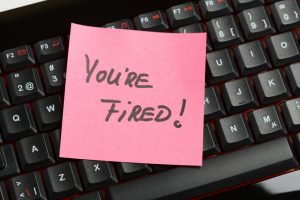 I’ve said before: be slow to hire and quick to fire. Everyone makes mistakes, and if someone isn’t making mistakes, they aren’t taking risks. That is probably even worse for the long-term viability of that employee and the company.
I’ve said before: be slow to hire and quick to fire. Everyone makes mistakes, and if someone isn’t making mistakes, they aren’t taking risks. That is probably even worse for the long-term viability of that employee and the company.
But when is making a mistake grounds for firing someone?
Last week, I read a LinkedIn quote about how a CEO would not fire an employee who made a half-a million dollar mistake because that was an expensive learning experience the company needed to grow from. I was skeptical, but I think that if an employer is following the slow to hire method, this makes sense.

A Career In Legal Services: Practising Law Institute Honors Toby J. Rothschild
PLI honors Toby J. Rothschild with its inaugural Victor J. Rubino Award for Excellence in Pro Bono Training, recognizing his dedication and impact.
But how do you know when it’s time to make that quick firing decision? A great example comes from President Trump’s current legal foibles. And his relationship with his employee/first-born son, Donald Trump Jr.
You Can’t Fire Family, Can You?
Last week, the twitterverse exploded when Donald Trump’s son and namesake released emails that seem to show he was colluding with the Russian government to help his father’s campaign. I’m just a lawyer, but if Russians approached me and told me they wanted to make a deal with me, I would call someone in government and report it. Last I checked, the Russians aren’t exactly our friends.
But Don. Jr. did not do this. Instead, he set up a meeting with himself and other Trump people, including his brother-in-law, to talk to the Russians.

Thomson Reuters Brings The Human Touch To Artificial Intelligence
A “human-in-the-loop” approach helps us bring responsible and effective AI solutions together.
This is a very very big mistake. Even if it is nothing that the news outlets think it is. The optics are terrible. But I think they knew it was a mistake when it happened. Immediately after the communication, he hired a criminal-defense attorney.
So When Should I Leave The Family Business?
I would not work for the Trump family, but if you do, more power to you. However, I think the example of Don Jr. illustrates an important point: when does an employer (or employee) decide that enough is enough, and it’s time to cut bait and run? Of course his daddy didn’t “fire” him. But I think he should.
Most of the people reading this are in an at-will state, where any reason is a good reason to fire someone, so long as it isn’t illegal. You can leave your job at any time without repercussions (as long as you are at-will). But if an employee is in a protected class (protip: everyone is in a protected class), and if you want a business that is successful, your workforce decisions should not be done willy-nilly. Decisions should be well thought out and with the best interest of the company in mind. So repeated mistakes by any employee matter.
And sometimes, an employer will need to fire family. In fact, there are two scenarios where even family should get the axe:
- The mistake is so serious it threatens the business. If any employee brings attention from regulators and/or other government officials, it is likely that this person has made a mistake so grave, they should no longer be employed. Regardless of the perceived investment or value, the person is creating a bad precedent. So often, employers call me wanting to fire someone they don’t like for behavior that is problematic. One of my first questions is: is there anyone else at your company doing this bad thing? Sometimes there is. Sometimes it’s an employee they like, but that person’s behavior doesn’t seems as egregious. Firing that “annoying employee” may not be a good idea. Employers must be consistent. A fireable offense for one employee is a fireable offense for another. Regardless of who they are.
- The company is facing viability issues and the mistake factors into the decision of who should be fired, because performance matters. If you can’t pay your workforce, you have to do something drastic: fire enough of them until you can. Performance should absolutely be a factor if you are deciding between two individuals in similar job functions. If a company faces the need to shrink to survive, the factors used to determine who stays and goes should be uniformly applied to everyone, including any favorites at the company.
And if you are an employee, even if you work for your mother, there are times when you leaving should be on the table. If I had the last name Trump but I wanted a serious career in government, I would either seriously distance myself from the current administration (as in a job at an agency that is totally out of the limelight) or consider sitting out a while or entering a different field. At least until the current scandal blows over.
But if your consideration is more nuanced, here are some suggested factors:
- If the company isn’t stable and/or viable, and you don’t have an ownership interest and the authority to work to save it, it is likely better to consider other options. Even if your parents own it, because even if they do, you don’t own it, and it may not be around for you to ever own it if things continue in the way they are going. Regardless of your relationship with the people you work with, it is a job, and the long-term viability of your career must be a consideration, even if money is not a big factor. If you have developed significant time and effort to grow your competencies and skill set, don’t let anything waste that time and effort, even family.
- If the management of the company doesn’t make decisions that are in the best interest of the company, you should think twice about your future there. This applies to anyone in a job, regardless of who you work with. Personnel and business decisions need to be made intelligently and with the welfare of the company in mind. They don’t have to make sense to everyone, but they do need to make sense for the company’s long-term strategy. Hires and fires divorced from business necessity are a recipe for disaster. Perhaps if you know a company is endlessly bankrolled from an inheritance, it may allay concerns about financial viability. But if you want a job that is good at a company that is great, run away from any company where management of the company doesn’t make decisions in the best interest of the company.
A company can be a great place to work and have many employees with the same last name. If those employees are also hardworking and dedicated to the business, and have the extra concern of letting daddy down, that may make them even better co-workers. But if those employees are taking advantage of their invincibility, it will likely result in scandal. If you are the town paper or a local bakery, it may make your employer the stuff of gossip fodder. If you are the president of a country, it is something much greater.
At the end of the day, what we do for work is a huge piece of who we are, and where we do it, greatly impacts our well being. So where we work, and with whom, is a very important life choice. Choose wisely.
 Beth Robinson lives in Denver and is a business law attorney and employment law guru. She practices at Fortis Law Partners. You can reach her at [email protected] and follow her on Twitter at @HLSinDenver.
Beth Robinson lives in Denver and is a business law attorney and employment law guru. She practices at Fortis Law Partners. You can reach her at [email protected] and follow her on Twitter at @HLSinDenver.